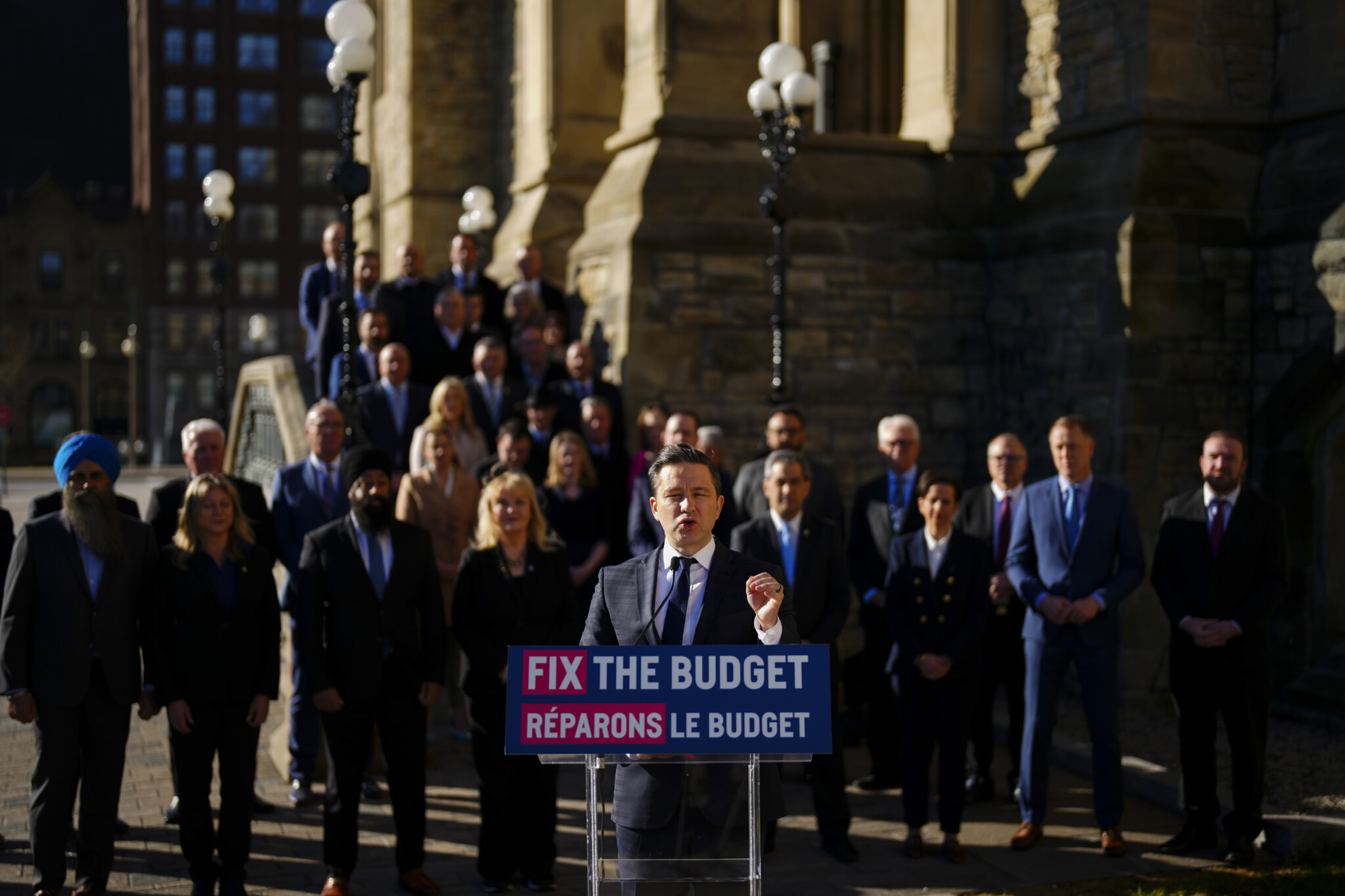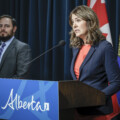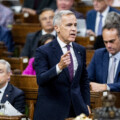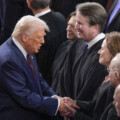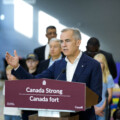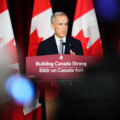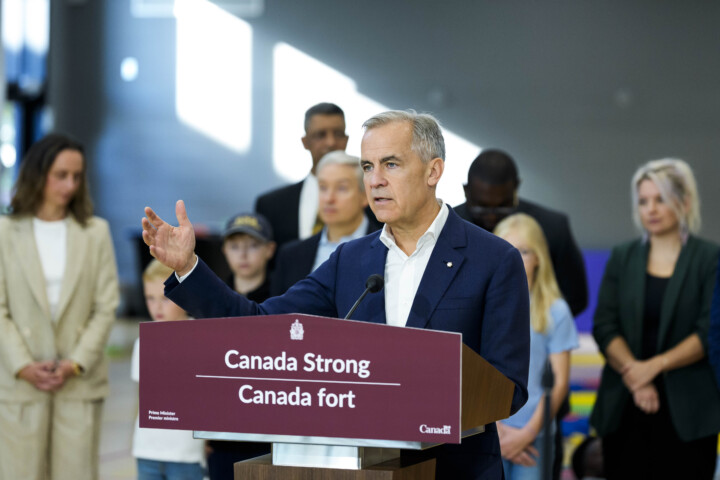Members of Parliament are set to return to Ottawa this coming Monday after a long but eventful parliamentary summer break.
Only days before Parliament was set to reconvene, NDP Leader Jagmeet Singh announced he was “ripping up” his Supply and Confidence Agreement with the Liberals. Singh also came out against the Trudeau government’s carbon tax Thursday, saying the policy puts a “burden on the backs of working people.”
Over the summer break, the Liberals also experienced an historic byelection loss in the safe Toronto seat of St. Pauls, and saw their national campaign director and a prominent cabinet minister resign. In an attempt to right the sinking ship, they appointed former Bank of Canada and Bank of England governor Mark Carney as a special economic advisor.
This summer was also an eventful one for the Conservatives, who dispatched their leader on a whirlwind tour across Canada, including nine provinces, 86 ridings, and 75 job sites. They also shocked many by claiming victory over that Toronto riding the Liberals lost; the first time they had won it since the 1980s.
Amidst all of that, many are anticipating a charged fall parliamentary session.
The Hub spoke to Hamish Marshall, a Conservative political strategist and partner at One Persuasion, and Kate Harrison, a Conservative political analyst and vice chair at Summa Strategies, about what Canadians can expect from Poilievre’s Conservatives heading into the fall parliamentary session.
A non-confidence motion “at the earliest possible opportunity”
Poilievre unveiled a key part of his strategy for the return to Parliament at a press conference outside West Block on Tuesday: an attempt to topple the Trudeau government and trigger an election via a non-confidence motion.
It's put up or shut up time for Sellout Jagmeet Singh.
— Pierre Poilievre (@PierrePoilievre) September 11, 2024
Will he vote for the people or for his pension?
Will he vote non-confidence in Justin Trudeau to call a carbon tax election now? https://t.co/ECH7waj3mu pic.twitter.com/Dy7VPjFwGX
“I’m announcing the common-sense Conservatives will put forward a non-confidence motion at the earliest possible opportunity,” said Poilievre.
Citing the NDP ending its two-year deal with the Liberals, the Conservative leader said “If you’re pulling out, you have to vote non-confidence.”
“It’s put up or shut up time for the NDP.”
In order for Poilievre’s Conservative caucus, with their 119 seats, to successfully topple the government and trigger an election, they will need support from both the NDP, with 24 seats, and the Bloc Québécois, which holds 32 seats. Meanwhile, the Liberals, with 154 seats, only need support from one opposition party to remain in power.
When asked about Poilievre’s attempt to topple the government right out of the gate, Singh shot back, saying he is “never” going to listen to the Conservative leader. “I’m not going to listen to your advice. You want to destroy people’s lives, I want to build up a brighter future,” he told reporters this week.
While the Bloc Québécois has voted with the Conservatives in previous confidence votes, such as the 2023 and 2024 federal budgets and the vote to invoke the Emergencies Act in response to the trucker convoy, Bloc leader Yves François Blanchet also seems uninterested in helping Poilievre this time round, saying “our job is not to give him…strength.”
Both Marshall and Harrison told The Hub a fall 2024 federal election is unlikely.
“I would be surprised if the NDP decided they wanted to trigger an election the same fall where there’s both an election in British Columbia and Saskatchewan,” explained Marshall.
For her part, Harrison noted that she thinks “there’s only one party that is keen to go to an election right now, and it’s the Conservatives.”
The Conservatives have already nominated 153 candidates for the next election, with the Liberals having nominated approximately 105. The NDP only have about 60.
Meanwhile, fundraising figures from the second quarter of this year show the Conservatives on top with $9.8 million in donations, while the Liberals raised $3.8 million, the NDP raised $1.3 million and the Bloc Québécois raised just under $322,000.
Harrison said the unlikelihood of success in trying to trigger an election “doesn’t take away from the importance of the effort for the Conservatives.”
“I think that it makes their supporters pleased to see that they continue to be a real driver of an opposition,” she said, adding that a failed motion would allow Conservatives to stand out amongst the other opposition parties. “If you’ve got the NDP and the Bloc allowing the Liberals to continue on… the Conservatives look like the true opposition.”
“I believe campaigns are about contrast, and contrast wins elections,” said Harrison.
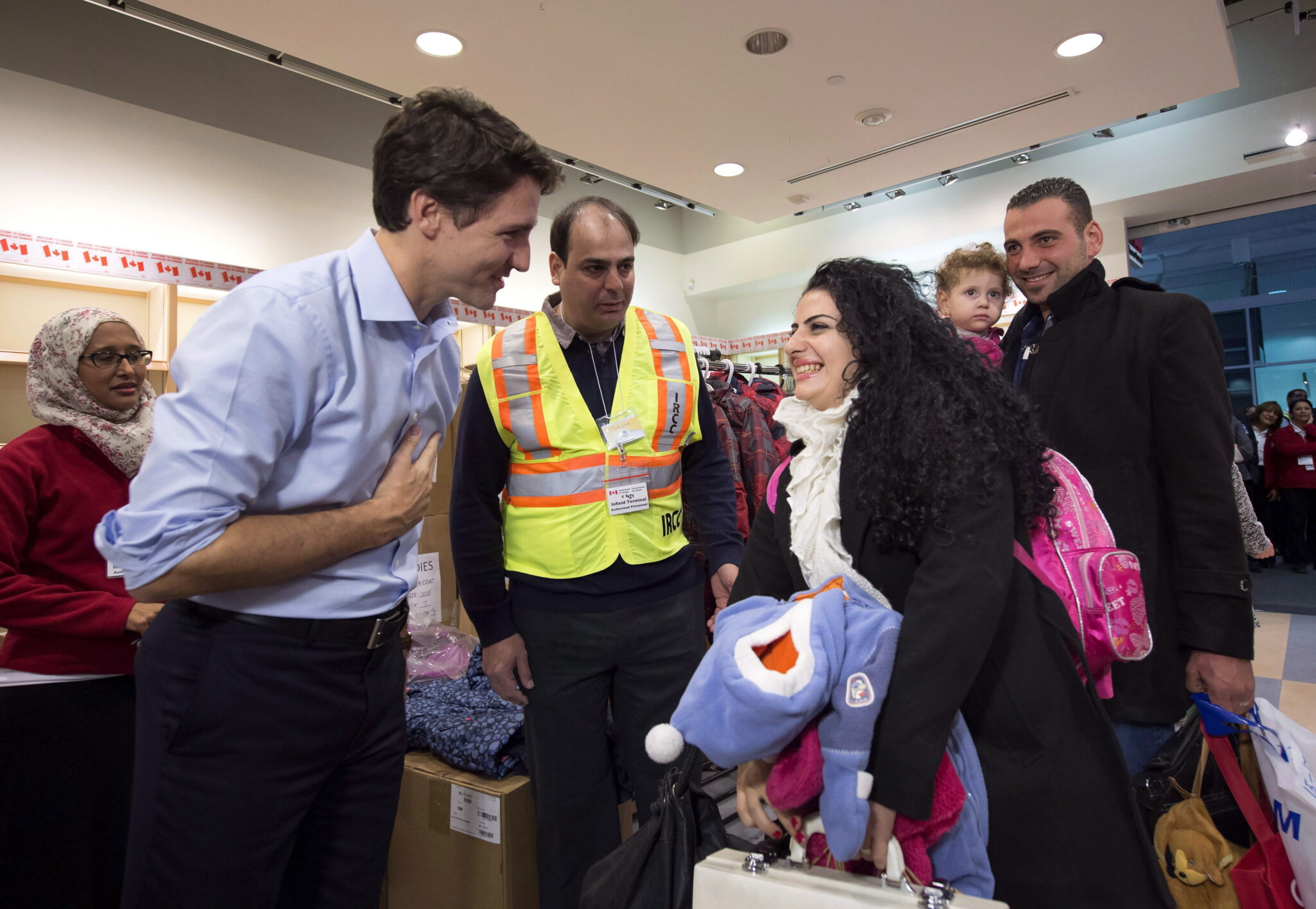
Canadian Prime Minister Justin Trudeau greets a family of refugees from Syria as they arrive at Pearson International airport, in Toronto, on Friday, Dec. 11, 2015. Nathan Denette/The Canadian Press.
Immigration: the sleeper issue
One issue Poilievre has been increasingly talking about recently is immigration. Both Marshall and Harrison believe Conservatives will now be more comfortable discussing the once hot button topic heading into this fall’s session.
Poilievre’s vocal criticism of Trudeau’s pro-immigration agenda is relatively new. The Conservative leader previously made his own pro-immigration promises to diaspora groups, and told the National Post back in 2022 that he did not believe immigration was the cause of the housing crisis. Some had begun to argue that rapidly increasing the newcomers allowed into Canada could put strain on the country’s already struggling housing, healthcare and transit systems.
But with Canada having taken in a whopping 471,771 permanent immigrants and 804,901 non-permanent residents last year, and the latter revealing a major lack of government oversights around the scale of temporary foreign workers and international students being accepted, the Conservative leader has adopted a more aggressive tone on the issue.
Poilievre recently accused the Liberal government of having “destroyed” Canada’s immigration system, claiming they “opened the floodgates.” He’s since pledged that immigration levels will be “much lower” if he’s elected and that he’ll cap immigration and tie it to housing. Poilievre has also promised to “block temporary foreign workers where they are taking jobs from Canadians” and extend the cap on the number of international students.
Harrison told The Hub that immigration is “the sleeper issue for the fall in terms of Canadian public opinion.”
She added that “the conversation around immigration and growth is moving very rapidly,” noting that “we’re seeing politicians [from] all parties respond to concerns being raised by Canadians, and I don’t believe these are xenophobic concerns.”
Marshall noted that he does not think immigration is “a controversial issue in the way it might have been a few years ago,” noting that even the Liberals have moved to restrict certain immigration to Canada.
“I think the Canadian consensus is to be a lot more skeptical about immigration without the appropriate checks and balances.” he said. Just days ago, the federal government admitted that a man charged with allegedly plotting to attack Jews in New York on October 7, had entered Canada on a student visa.
It should be noted that support for Poilievre’s Conservatives remains very high among certain ethnic groups, like Hindus and Sikhs. A recent leger poll also saw 50 percent of south Asian immigrants, 64 percent of Southeast Asian immigrants and 55 percent of Chinese immigrants say the government’s immigration plan will “admit too many immigrants to Canada.”
Poilievre’s four policy pillars
Both Marshall and Harrison say Poilievre should also continue pushing the four policy pillars he unveiled in January: “Axe the tax, Build the homes, Fix the budget, Stop the crime.”
“Those four pillars are absolutely key,” said Marshall. “It resonated, and pounding away at them has seen the Conservatives continue to climb in the polls, and be able to win a seat like Toronto–St. Paul’s.”
“Everything I see as a public opinion pollster backs up that those are the issues that are top of mind for most Canadians,” he added.
Harrison echoed Marshall.
“There’s no real need to change or shake up the message that they’ve been putting out there.” She added that the four pillars are “broadly a reflection of what people in Canada are concerned about.”
Parliament resumes on Monday, September 16.
